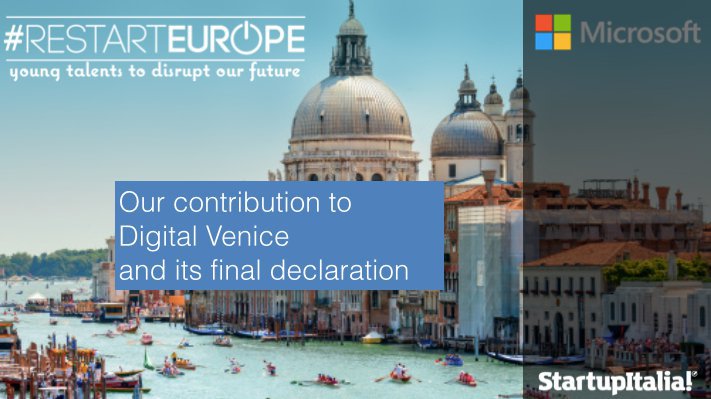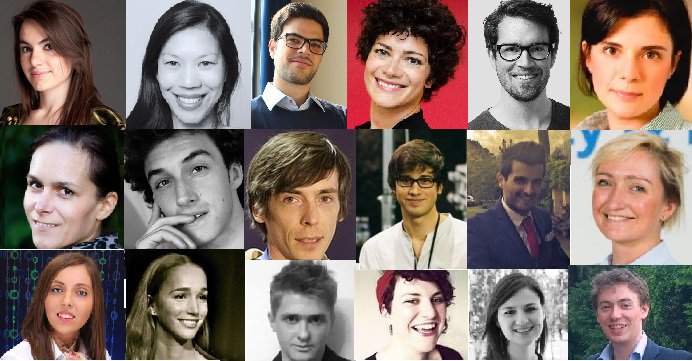Young people from over 24 different European countries met at Restart Europe in Venice with the goal of drawing up a paper on digital education
161 innovators arrived in Venice from all over Europe on July 7 for the Restart Europe event. 25 of them discussed the topic of schools and innovation during a round table on digital education.
THE 25 PARTICIPANTS. Spanish, French, Germans, Italians and many other young people from over 24 different European countries met with the goal of drawing up a paper on digital education, to present to Italian Prime Minister Matteo Renzi during the Digital Venice event that was held the following day.
Andrea Gerosa the founder of Think Tank for Youth, Alessandro Magnino of Vodafone, and Alessandro Rimassa from IED, moderated the group dedicated to schools and innovation while the participants were:
- Carla Abreu, 24, member of the administration council of Junior Achievement Alumni in Portugal.
- Candy Behunin, marketing and communications manager for AdEven events organizer.
- Andrea Castiglione, 23, defines himself as digital entrepreneur and business developer, co-founder of Kiwi B2B
- Francesca Cavallo, co-founder and creative director of the media company dedicated to children, Timbuktu Labs.
- Lasse Clausen, co-founder and CEO di Foundd, a multimedia search engine
- Valentina Dardo, retail consumer group in Microsoft Italia
- Katrien De Graeve, technology strategist partner in Microsoft Belgium
- Marco De Rossi, CEO of Oilproject, a platform that provides free learning resources
- Claudia Feichtinge,
- Jason Fontana, defines himself as a biohacker and scientific blogger
- Thomas Herzog, supports young startuppers in starting their own businesses
- Antimo Musone, an IT architect with vast open source experience
- Giovanna Neffat,
- Attila Olah, expert in design and development of IT solutions
- Veronica Ortolani, product manager in Microsoft Italia
- Paula Schwarz, 24, works at the Good Cop Bad Cop incubator
- Kamil Stachowicz, academic program manager
- Anders Stolzenbach, founder of Free Grip and, more recently, YouBeRu.
- Clare Sutcliffe,
- Baris Tamer, co-founder of Klash
- Blerta Toska, IT solution specialist at Vodafone
- Rüdiger Trojok,
- Matteo Valoriani,
- Sandra Vukašinović,
- Michal Zálešák,
THE RECOMMENDATIONS. When the last siren rang (to indicate the end of the work session) a summary of the 10 hottest topics for digital schools had been made:
1) Improve collaboration and partnerships between businesses and schools. Schools should produce what the market needs. For this reason, as well as a structured (and not improvised) knowledge of the drafting of CV’s, it is important to create opportunities for encounters between the two parts.
2) Favoring learning skills . The main recommendations for developing digital capabilities right from the first years of schooling are the following three: capacity to communicate, critical thought, and the propensity towards teamwork.
3) Promoting the integration and inclusion of immigrants with digital tools. Technological tools can be used to overcome linguistic barriers and create easier inclusion of foreign children in Italian schools.
4) Facilitate accessibility to schools independently from the limitations of age and status. To improve the learning system it is useful to use open source.
5) Promote education and technological literacy through the use of social channels.
6) Stimulate the learning of scientific materials through a mathematical thought model and problem solving.
7) Reflect on the Political Agenda. Public investments must attempt to reduce the gap between ICT competencies.
8) Train teachers. Better tools must be provided for professional development like open source platforms.
9) Renovate schools…starting with the design. Innovation starts with the surrounding environment, which, if it is stimulating, contributes to the diffusion of knowledge and new competencies.
10) Develop and strengthen the infrastructure.
At the end, Alessandro Fusacchia, Head of the Council of the Education Minister, commented realistically and hopefully on the occasion of Italy equipping itself and getting aligned with the European system (starting from the bottom):
“There is bad news and good news: we do not have much time to realize all of the proposals that have been made, but we do have the occasion in this European semester to draw up a path for the digital agenda for the next five years. We will not let this become the umpteenth beautiful meeting between beautiful people”.
“When one talks about Europe, one must talk about young people and education. We ask that all schools are connected to WiFi and that teachers are trained so that they can use all technological and digital means. Today, life-long learning is very important”.
Here is the photo gallery:
























